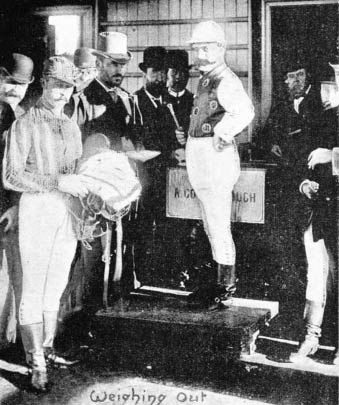Making weight
There is immense pressure for jockeys to meet ‘correct weight’ (the weight set by the handicapper) on race day. Failing to ‘make weight’ may lead to fines, suspensions, missed races and lost income. Some jockeys severely restrict their diets or turn to diuretics, laxatives, hot baths or saunas to lose or keep off weight, which can lead to long-term health problems.
Jockeys must weigh in before and after each race, and only a 0.5 kg difference is permitted. If a jockey is booked to ride several horses in a day under a certain weight, there is little flexibility for eating or drinking between races. Energy depletion and dehydration, however, can result in a poor performance on the track.
 Zoom
Zoom
J Barbour, the jockey who rode Apsley to a Grand National Steeplechase win at Flemington in 1894, weighs in after the race.